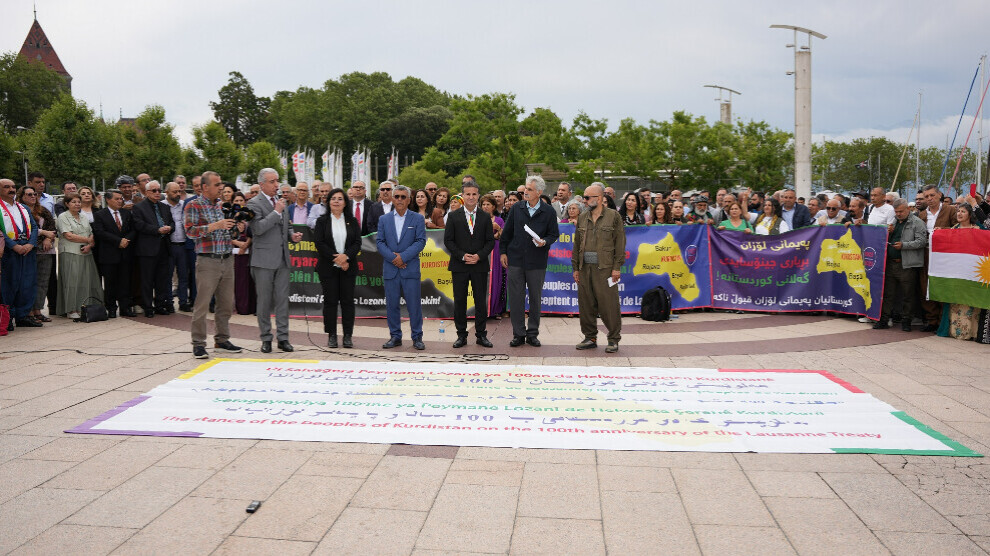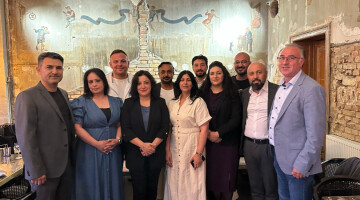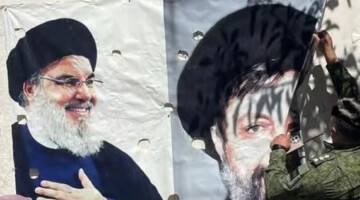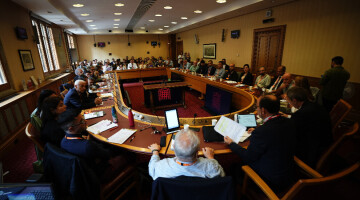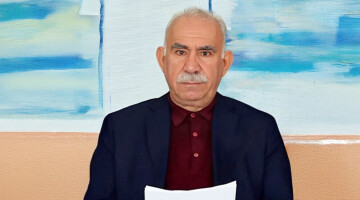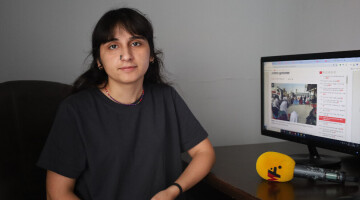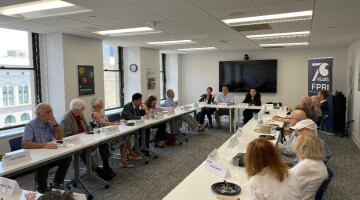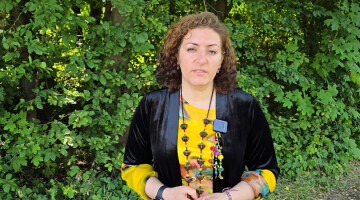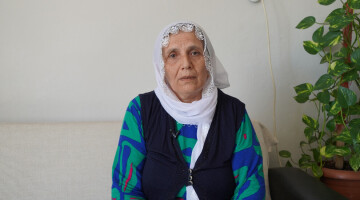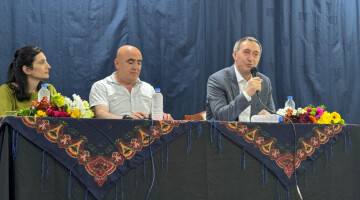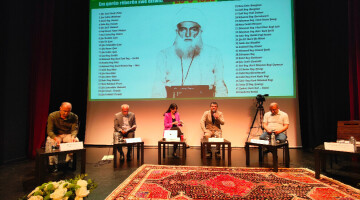The results of the two-day conference organised by Kurdish representatives on the occasion of the 100th anniversary of the Treaty of Lausanne were announced in Lausanne at the Beaulieu Congress Centre. More than 600 delegates from the four parts of Kurdistan participated in the conference, which was held at the weekend under the slogan "We Kurds are here on the 100th anniversary of the Treaty of Lausanne and reject the agreement". The final declaration was presented at a press conference in front of the Château d'Ouchy on Monday.
The final declaration stated that the Treaty of Lausanne was signed against the will and acceptance of the Kurdish people and that the Kurds have been fighting against it for a hundred years. Before reading the declaration, the organisers of the conference thanked the Mayor of Lausanne, Grégoire Junod, for his support. Ahmet Karamus, co-chair of the KNK (Kurdistan National Congress), introduced the conference by saying: "For four days, representatives of Kurdish parties discussed this treaty with intellectuals and artists in Lausanne. At the conference, there was a broad legal and political debate on the consequences of the treaty. The fate of the Kurdish people took a decisive turn a hundred years ago. We, the Kurdish people, are here to correct this historical injustice."
KNK co-chair Zeyneb Murad said: "As a result of the Kurdish people's struggle, we are here today making our voice heard in the world. Our people have been resisting for a hundred years in the four parts of Kurdistan. They are resisting to defend their land and their identity. They are resisting for democracy and peace."
The final declaration, which contains proposals and resolutions that relate to the regional, national and international levels, is as follows:
"On the occasion of the 100th anniversary of the Treaty of Lausanne, the Kurds and other peoples of Kurdistan took part in the Lausanne Conference.
The process of the sinister Treaty of Lausanne was discussed in detail. 100 years ago, the leaders of the Turkish state and certain European states (Great Britain, France, Italy, Greece, Romania, Bulgaria, Portugal, Belgium, Serbia, Croatia and Slovenia, the countries that later became Yugoslavia) and Japan (all the states of the Western world) sat around a table and decided the fate of Kurdistan.
In the process of forming this sinister treaty, which is a black stain on history and confirms the negation of our nation, the Kurds were not seen, they were not mentioned, they were not listened to, and the Kurds were not given the opportunity to express their wishes, to elect their representatives and to become a party to the treaty.
Faced with this reality, we, the Kurds and the other peoples of Kurdistan, reject the Treaty of Lausanne from the outset, recognising it as illegitimate and null and void!
Although 100 years have passed since the Treaty of Lausanne was adopted, its destructive consequences for the peoples of Kurdistan are still fresh and painful. Kurdistan has been suffering for exactly 100 years... It is also exactly 100 years that our people have been waging a very difficult historic struggle against colonialism and this fragmentation. In each part of Kurdistan, which was divided by the Treaty of Lausanne, a national liberation struggle has been waged and is still being waged. This struggle resulted in the martyrdom of hundreds of thousands of our sons and daughters, whom we commemorate with respect and to whom we confirm our loyalty. Similarly, in our historic struggle for national liberation, dozens of pioneering leaders were massacred and captured. While commemorating the murdered leaders, we support the struggle for the release of the captured leaders, in particular Abdullah Öcalan.
Although the great suffering began with the first treaty of division, the Treaty of Kasr-ı Shirin, signed between Iran and the Ottomans, it was intensified by the Treaty of Lausanne. The Iranian state implicitly supported the Turkish state in the re-division of Kurdistan, although it did not do so explicitly in the Lausanne Treaty process.
The Turkish State, in turn, by all immoral and inadmissible means, created the Lausanne Treaty process and achieved its inhuman racist objective.
The signatory states of the Western world together victimised the Kurds and all the peoples of Kurdistan and divided the territory of Kurdistan on the Ottoman map into three parts and gave it to the Turks and Arabs as a gift.
We, the Kurds and peoples of Kurdistan, on the occasion of the 100th anniversary of this unjust and denigrating treaty, strongly condemn the State of Turkey and the other European States and Japan that are parties to this treaty.
The injustice done to all the peoples of Kurdistan continues today in other forms, and unfortunately, the policy of genocide is still supported by the signatory countries.
On the occasion of the 100th anniversary of the Treaty of Lausanne, the Turkish state is pursuing a Lausannist policy and occupying the parts of Kurdistan that lie within the official borders of Iraq and Syria, section by section, and fragmenting Kurdistan within itself once again. In Northern Kurdistan, it is using every means and method to disrupt the demographic structure and wants to wipe Kurdistan off the map of the Middle East and even the map of the world. Today, the Turkish state, with its Lausanne policies and military violence, wants to expel the Kurds and all the other peoples of Kurdistan from their lands and liquidate Kurdistan both politically and physically.
On the 100th anniversary of the Treaty of Lausanne, the signatory states of the Western world are facing a moral test of conscience. They must take a stand against the new Lausanneist policies of the Turkish state and make amends before history and in the hearts of the Kurds and all the peoples of Kurdistan.
In this context, we, the Kurds and peoples of Kurdistan, hope and desire that the signatory states of the Western world will cancel their signatures, declare this openly and support Kurdistan and its just struggle in the present circumstances.
In this context, we, the participants in the Kurdistan Conference in Lausanne, would like to share these wishes and desires with the public on behalf of all the peoples of Kurdistan.
Today, on the 100th anniversary of the Treaty of Lausanne, we, the Kurds and all the peoples of Kurdistan, are here in Lausanne and we firmly reject, do not recognise and do not accept the Treaty of Lausanne!
We do not accept the dismemberment of Kurdistan in any way whatsoever and we consider the policies of dismemberment to be a great crime against humanity.
Whichever state has participated in this disintegration, we do not forgive it in conscience or morally.
The Kurds, like all peoples, have the right to self-determination. Unfortunately, this legitimate right of the Kurdish people has not been recognised either yesterday or today. It was with this mentality that the Treaty of Lausanne was imposed on the Kurdish people and the other peoples of Kurdistan.
Despite this fact, in the realpolitik of today's world, we, the Kurds and the other peoples of Kurdistan, would like to insist on this point:
1. The Treaty of Lausanne must be annulled in its entirety within a reasonable period of time.
2. Until the Treaty of Lausanne is annulled,
A. The parts of Kurdistan that remain within the borders of the states of Turkey and Syria must be officially called Kurdistan and their self-determined status within Turkey and Syria must be recognised.
B. The part of Kurdistan that remains within the borders of the Federal Republic of Iraq must also be officially recognised as Kurdistan and recognised as a self-determining part of Turkey and Syria and the territories that have been separated from the borders of Kurdistan must be reunited with Kurdistan.
C. The eastern part of Kurdistan has been occupied by Iran since the Treaty of Kasr-i Shirin. Although Iran is not officially a party to the Lausanne Treaty, it has always supported the dismemberment of Kurdistan and, in this position, has acted de facto as a party to the Lausanne Treaty. Therefore, the Iranian state must recognise and implement the right of the people of Eastern Kurdistan to self-determination as its status.
D. This autonomous status of Kurdistan must be internationally recognised and represented within the United Nations system.
3. The state parties to the Treaty of Lausanne must pay compensation for the grievances of the peoples of Kurdistan. A High Commission should be established within the UN system for this compensation.
4. The United Nations, the European Union, the United States and the world democratic and humanitarian community should press the Turkish state to grant a general political amnesty and to fully implement the provisions of the Treaty of Lausanne, which are relatively favourable to the Kurds and non-Muslim minorities.
5. As an integral part of the Kurdish nation, the Yazidis, who consider themselves to be the oldest Kurds and who are non-Muslim Kurds, should be recognised as "non-Muslim minorities" and the rights accorded to Armenians and Assyrians-Chaldeans should also be accorded and applied to Yazidi Kurds.
6. An international commission should be created under the auspices of the United Nations, including representatives of the Kurdish people, and this commission should establish a dialogue with the States parties to the Treaty of Lausanne, and a dialogue and peaceful means should be found and implemented in practice for a short-term solution.
7. To achieve all these objectives, the Kurdish people and all the peoples of Kurdistan must form a political unity at the highest level, and the weaknesses and deviations that are developing internally must be overcome. The stranglehold that the enemies have placed around the neck of the Kurdish people can only be broken by establishing a great national unity. On the occasion of the hundredth anniversary of the sinister and negationist Treaty of Lausanne, this great conference of the Kurds and all Kurdistanis calls loudly and clearly on the vanguard and leadership of the Kurds and other Kurdistanis to fulfil their national and territorial duties without apology, to form the great alliance of Kurdistan and to convene a Kurdish national conference to this end.
8. A coordination committee will be set up to deal with these requests.
9. A committee of experts will be set up and authorised to create a common Kurdistan diplomacy.
II. The decisions
100 years after the Treaty of Lausanne, the decisions of the Lausanne Conference
The Lausanne Conference took these decisions with one voice and one heart:
1. A committee or commission of experts will be set up to monitor the conference's decisions and ensure that they are implemented in practice.
2. Diplomatic relations will be established with the States parties to the Treaty of Lausanne, other than the Republic of Turkey, and the historical injustices committed against the Kurds and other peoples of Kurdistan will be mentioned and support will be sought from them for their redress.
3. Active work will be done towards an alternative international treaty.
4. The Turkish state is urged to keep its promises to non-Muslim minorities, in their entirety and without discrimination.
5. As members of the Kurdish nation, the Yazidis, who are recognised as the oldest Kurds and who are non-Muslim Kurds, should be recognised as "non-Muslim minorities" and the rights accorded to Armenians and Assyrians-Chaldeans should be recognised and applied to Yazidi Kurds.
6. The Kurdistan Regional Government and the leadership of Western Kurdistan are invited to set up an office to study the Treaty of Lausanne, its consequences and the redress of grievances.
7. The National and Territorial Union of Kurdistan will be created as a consultative, guidance and warning body with the participation of all dynamics.
8. The political leaders of South Kurdistan and West Kurdistan are invited to remove all barriers between them and to establish high-level political, economic, social and cultural relations between them.
9. The creation of a common organisation for the joint conduct of Kurdistan's diplomacy on the international stage.
10. The Turkish State is invited to release all hostages, prisoners and political detainees, in particular the leader of the KCK, Mr Abdullah Öcalan.
11. The Turkish, Iranian and Syrian governments are invited to dialogue with the representatives of Kurdistan in order to work out democratic solutions and to recognise the legitimate rights of Kurdistan.
12. The Government of Baghdad is called upon to respect the rights of the Kurdistan Region guaranteed by the Federal Constitution of Iraq and to restore to the Kurdistan Region the areas that have been separated from it.
13. The Government of Baghdad is requested to recognise Shengal as an autonomous Yazidi region.
14. The United Nations is asked to deploy a peacekeeping force between Western Kurdistan and Turkey.
15. The United Nations is invited to open an office to represent Kurdistan."

